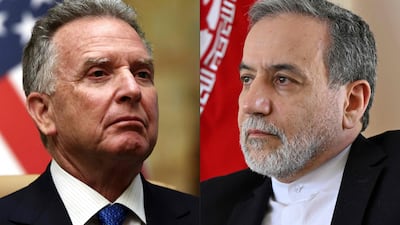Iran's enrichment of uranium is "non-negotiable", Foreign Minister Abbas Araghchi said on Wednesday after US special envoy Steve Witkoff said the country must halt its nuclear activities.
"Iran's enrichment is a real, accepted matter. We are ready to build confidence in response to possible concerns, but the issue of enrichment is non-negotiable," Mr Araghchi told reporters after a cabinet meeting.
Mr Araghchi and Mr Witkoff are leading their countries' delegations in the dialogue, which is expected to continue on Saturday, a week after Oman hosted the first high-level talks between the two sides since President Donald Trump withdrew the US from a milestone nuclear deal in 2018. The venue for the second round will be Rome, Iranian state media reported on Wednesday.
Mr Witkoff had said on Tuesday that Iran must “stop and eliminate" its nuclear programme to reach a deal with Washington, contradicting his remarks a day earlier.
The head of the International Atomic Energy Agency, Rafael Grossi was in Tehran on Wednesday for talks with top officials. The UN's nuclear watchdog reports that Iran has ramped up its production of 60 per cent enriched uranium, a level that the US and European powers say has no credible civilian use.
Mr Grossi told French newspaper Le Monde that Iran was "not far" from being able to develop a nuclear weapon. Likening the process to a jigsaw puzzle, he said Iran "has the pieces and they could eventually put them together one day".
Working with the IAEA "is indispensable to provide credible assurances about the peaceful nature of Iran’s nuclear programme at a time when diplomacy is urgently needed".
A US deal with Iran "would only be completed if it is a Trump deal", Mr Witkoff wrote on X. "Any final arrangement must set a framework for peace, stability, and prosperity in the Middle East – meaning that Iran must stop and eliminate its nuclear enrichment and weaponisation programme.
“It is imperative for the world that we create a tough, fair deal that will endure, and that is what President Trump has asked me to do."

Mr Witkoff had previously said the nuclear programme would only be subject to verification and that Washington would accept a deal if Iran’s uranium is enriched to low levels.
The special envoy to the Middle East told Fox News on Monday that Iran “does not need to enrich past 3.67 per cent" – the limit prescribed under the 2015 nuclear deal.
“In some circumstances, they’re at 60 per cent. In other circumstances, 20 per cent. That cannot be. And you do not need to run – as they claim – a civil nuclear programme where you’re enriching past 3.67 per cent, so this is going to be much about verification on the enrichment programme.”
Next round of talks
The US official led a delegation that held talks with Iran's Foreign Minister Abbas Araghchi and his team in Oman last Saturday.
The White House said Mr Trump spoke on Tuesday with the sultan of Oman, Haitham bin Tariq, about the next round of talks. They also discussed continuing US operations against Yemen's Houthis rebels.
It is difficult to predict the outcome of the second round of talks, said Dina Esfandiary, an Iran expert and Middle East geo-economics lead at Bloomberg Economics.

"This is because the US administration doesn’t seem to know what they want. If they come in and request zero enrichment like Mr Witkoff alluded to, then talks will be over before they’ve begun," she told The National.
"But if they talk about limiting enrichment then there’s definitely scope for an agreement," she added.
Also on Tuesday, Mr Trump met his top national security aides to discuss Iran's nuclear programme. Mr Trump has threatened military action against Tehran if it does not give up the programme, while also stressing the need for diplomacy and negotiations.
White House press secretary Karoline Leavitt told reporters that Mr Trump's bottom line in the talks is Iran not obtaining a nuclear weapon.
Aniseh Tabrizi, an Iran-Iraq expert at Control Risks, a consultancy firm, said the success of the current round of talks would depend on how much patience the US showed and "whether something will actually need to be achieved sooner rather than later".
However, this "might be tricky to do", Ms Tabrizi told The National, as the talks are likely to continue only "if each side feels that it has an upper hand to gain something out of the discussion and concessions".
The Iranians are "portraying the talks [as] useful and constructive and is likely to go into them willing to make concessions". But Tehran is also looking "to gain something significant in return", she said.


